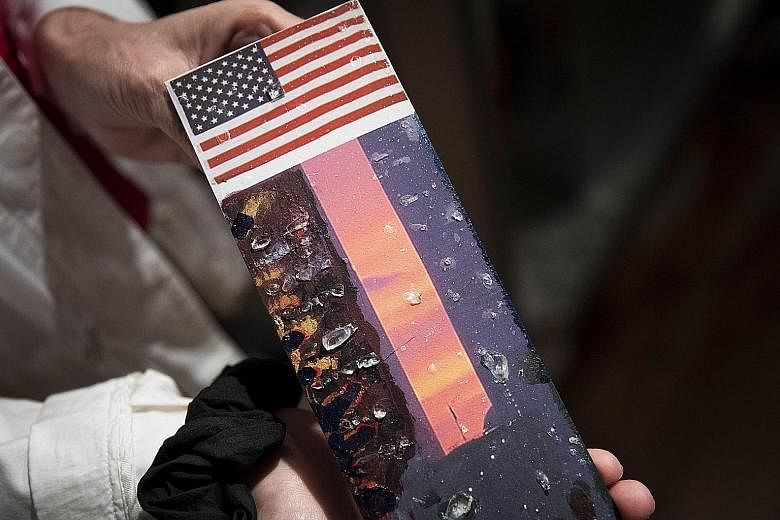NEW YORK • It's a typical late summer weekend in New York's Times Square, and tourists from around the world are snapping pictures beneath the commercial hub's iconic neon billboards - watched closely by a heavy contingent of police.
Four cruisers are parked in the middle of the busy intersection, and pedestrian zones have been surrounded by barriers to stop cars from ramming the crowd, a mode of attack favoured by violent extremists in recent years.
"I don't like to go to places like this," says Ms Sue Garcia, a massage therapist from Brooklyn. "Or anywhere where incidents have happened repeatedly - the fear comes to mind."
For New Yorkers who lost loved ones, narrowly survived or just witnessed 9/11, memories remain fresh and old wounds are reopened on its anniversary. And a perpetual state of high alert is the new normal. Nearly 3,000 people died in the terrorist attack on the World Trade Center on Sept 11, 2001,
Ms Garcia, now 33, was a high schooler when the planes slammed into the Twin Towers. She saw them burn, then collapse and walked all the way home like hundreds of thousands of New Yorkers that day after metro services were suspended.
"I was there, I saw it over and over again. I don't need to think about it," she says.
But her mind always drifts toward the horrors of that day whenever it is mentioned on TV, or even "when I hear an airplane". "It is like the trigger to the thought. It has subsided over the years but it is still there" she adds. Or while waiting to meet her sister in Times Square.
The episodes of anxiety described by Ms Garcia are a burden borne by many New Yorkers.
For those directly affected, the anniversary of the attacks is the "most dreaded date" of the year and post-traumatic stress can remain for an individual's entire life, says Professor Charles Strozier, a psychoanalyst and author of a book that documents the experiences of survivors and witnesses.
"There was a collective trauma, the sense of having been proven to be not invulnerable," he says. "To say that New Yorkers are still traumatised is an exaggeration. But they think about it, they are aware of it, they do have active fears just below the surface of consciousness about things like bombs in the subways," adds the professor, who watched the destruction of the World Trade Center (WTC) from his office just off Union Square.
Many are also convinced that, even though recent terror attacks have focused on Europe, it is New York, the beating heart of the Western world, that remains the prime target.
"What better target, unfortunately, than NYC?" asks Mr Tim Lambert, an IT consultant. Then, as now, he worked on the southern tip of Manhattan near the WTC site. The city, he says, is a "magnet for people from all over the world". "It symbolises the freedoms that we have, the money that we have. What better way to make a statement?"
To protect its 8.5 million inhabitants, New York has to remain fully prepared. A 38,000-strong police force that keeps watch over the city's public spaces, a massive network of cameras providing round- the-clock surveillance and a ubiquitous campaign to remind denizens "if you see something, say something" are all reminders of the cost of security.
Since 2001, the city has had its own anti-terrorist unit, which today has about 2,000 personnel and representatives in several foreign capitals, according to Mr Robert Strang, president of the New York- based Investigative Management Group.
AGENCE FRANCE-PRESSE

